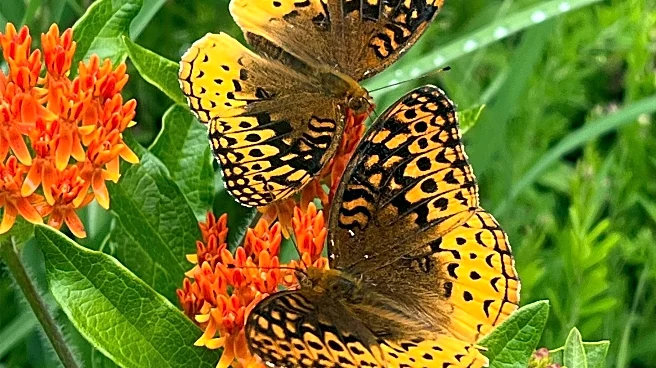What's Happening?
Native plant gardening is experiencing a surge in popularity as gardeners aim to support local ecosystems and pollinators. This trend is highlighted by the increasing membership in native plant gardening groups and rising sales at garden centers. The movement is driven by concerns over declining insect populations, including monarch butterflies and the endangered rusty patched bumblebee. Gardeners are finding empowerment in their ability to make a positive impact on local wildlife through native gardening, which offers immediate benefits and low maintenance. The initiative is supported by scientists who emphasize the ecological importance of native plants.
Why It's Important?
The growing interest in native plant gardening reflects a broader societal shift towards environmental conservation and sustainability. By planting native species, gardeners contribute to the preservation of insect populations, which are crucial for pollination and the food chain. This movement not only supports biodiversity but also fosters community engagement and education about ecological issues. As more individuals participate, the cumulative effect could lead to significant improvements in local ecosystems, benefiting both wildlife and human communities. The trend also highlights the role of individual actions in addressing global environmental challenges.
What's Next?
The continued expansion of native plant gardening is likely to influence public policy and urban planning, encouraging the integration of native species in public spaces and private gardens. As awareness grows, more educational programs and resources may become available to support gardeners in their efforts. Additionally, the success of native gardening could inspire similar initiatives in other areas of environmental conservation, further promoting sustainable practices. Stakeholders, including local governments and environmental organizations, may increase their support for native plant projects, recognizing their potential to enhance biodiversity and community well-being.
Beyond the Headlines
The native plant gardening movement also raises ethical considerations about human responsibility in preserving natural habitats. It challenges traditional gardening practices that prioritize aesthetics over ecological health, encouraging a shift towards more sustainable and environmentally friendly approaches. This trend may lead to long-term cultural changes in how society values and interacts with nature, fostering a deeper appreciation for the interconnectedness of all living organisms.









